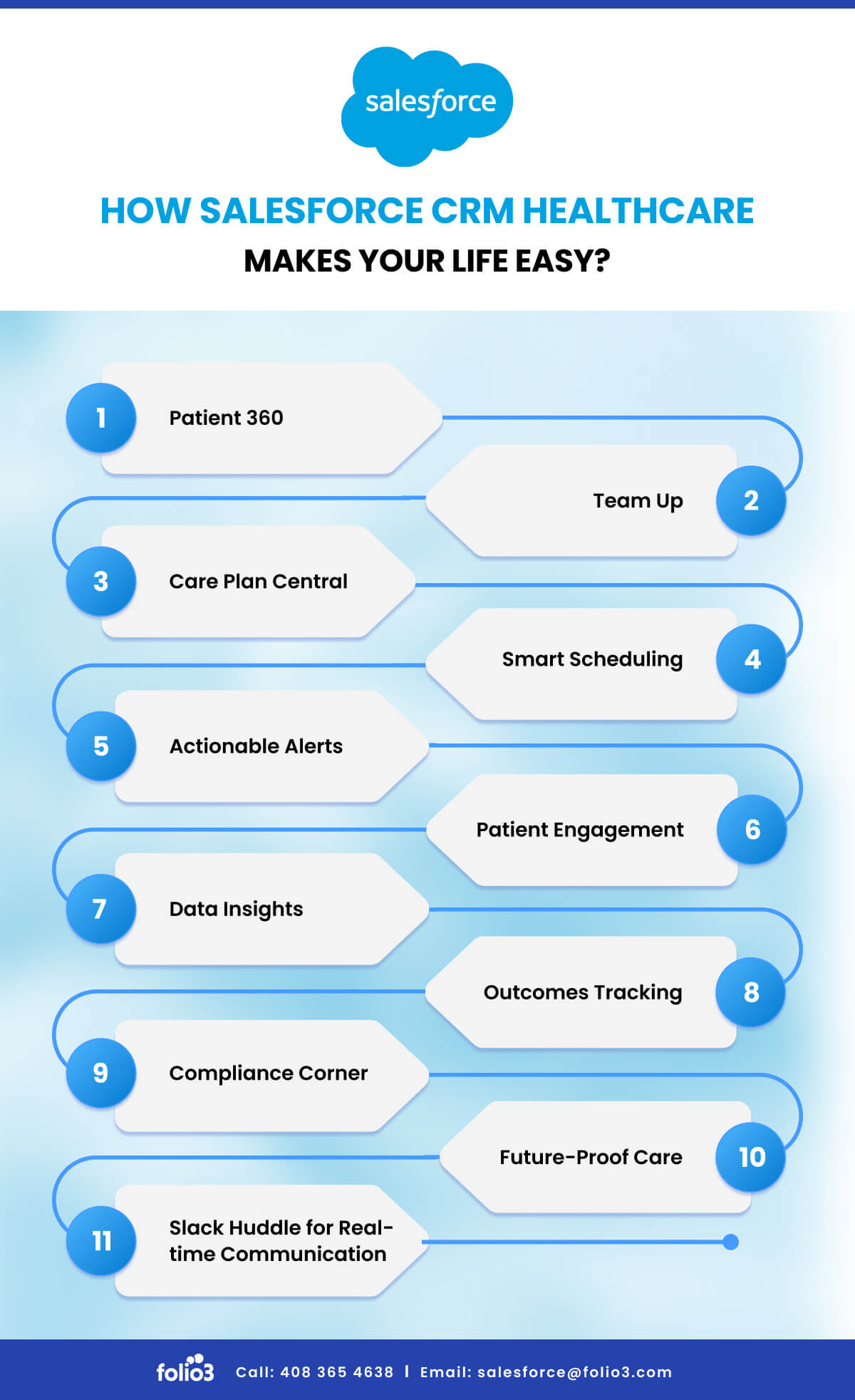The United States reportedly lost $524 billion annually due to poor care coordination. It is accompanied by avoidable readmissions and extended hospital stays, accounting for a significant portion of this burden. As a result, healthcare organizations face financial and health crises.
On the contrary, effective care coordination via Salesforce CRM healthcare leads to 17% lower hospital costs, 39% fewer readmissions, and 5% higher patient satisfaction.
This speaks volumes about the significance of Salesforce Health Cloud! This unified platform empowers stakeholders across the care sector to collaborate seamlessly. Health providers are now confidently turning to innovative solutions like Salesforce Health Cloud consulting services.
Now, the question that arises is how to make the most out of Salesforce CRM healthcare. This guide digs into the specific workflows and functionalities within Salesforce CRM healthcare that drive impactful care coordination.
Moreover, it navigates the complexities of modern healthcare and sheds light on how it delivers optimal patient experiences while optimizing your organization’s resources.
An Overview of Salesforce CRM Healthcare
Salesforce Health Cloud is derived from the Salesforce Customer Relationship Management (CRM) ecosystem. It aims to cater to the unique needs of the healthcare industry. From unifying disparate data and streamlining workflows to maintaining collaboration, it supports healthcare professionals to deliver exceptional outcomes.
Salesforce Health Cloud goes beyond traditional CRM to transform the healthcare experience for both providers and patients. Below, we will talk about the features of Salesforce CRM for healthcare that can make your life easier!
How Salesforce CRM Healthcare Makes Your Life Easy?
Salesforce health CRM is enriched with the following features that can help any health provider or organization effectively coordinate care:
Patient 360
A comprehensive understanding of each patient is essential. Salesforce’s ‘Patient 360’ feature allows healthcare professionals to access a complete patient information overview. From medical history to recent treatments, this brilliant approach enables informed decision-making.
Also, with the unified patient view, Salesforce CRM healthcare teams get the necessary insights that assist them in customizing their approach to improve overall patient outcomes.
Team Up
Effective care coordination hinges on proper communication among healthcare professionals. That’s where the team-up feature of Salesforce CRM healthcare addresses this issue.
It facilitates real-time collaboration among physicians, nurses, specialists, and administrators. This teamwork ensures that everyone involved in patient care is on the same page.
Care Plan Central
Salesforce CRM healthcare can easily develop and manage care plans even when multiple healthcare providers are involved. They are known for offering a centralized hub for creating, managing, and tracking care plans.
This streamlined approach ensures that every team member is aligned with the patient’s treatment goals—contributing to more effective and coordinated care delivery.
Smart Scheduling
Efficient appointment scheduling and resource allocation are crucial aspects of care coordination. But when it comes to Salesforce CRM healthcare, they smartly use data insights to maintain the process. Also, its predicted analytics abilities optimize these processes.
This way, healthcare departments schedule appointments based on availability to utilize maximum resources. In summary, healthcare providers can reduce wait times and enhance overall operational efficiency.
Actionable Alerts
Prevention is better than cure. So, proactive care management is essential for preventing potential health issues and complications. Its ‘actionable alerts’ feature provides healthcare professionals with timely notifications in case of criteria change.
Whether it’s changes in vital signs or missed appointments, real-time alerts enable healthcare teams to intervene and address emerging issues promptly. This way, Salesforce development services enhance care coordination, which leads to improved patient outcomes.
Patient Engagement
Active patient engagement is the foundation of successful care coordination. Salesforce CRM healthcare prioritizes this with the help of various tools and features.
Such as secure patient portals and interactive communication channels. Because of these tools, patients actively participate in their healthcare journey by accessing medical records and educational resources.
Patients’ increment in decision-making contributes to successful treatment plans. Overall, it leads to a favorable approach to care coordination.
Data Insights
In the era of healthcare analytics, data-driven decision-making is the key to impactful care coordination. The strong data reporting tools from Salesforce 360 allow healthcare professionals to derive insights from patient data.
By analyzing these trends and identifying the patterns, Salesforce CRM healthcare takes the initiative to enhance care coordination. Additionally, such insights also play a crucial role in other critical aspects.
Such as in the identification of areas of improvement, optimizing workflows, and ensuring efficient resource allocation.
Outcomes Tracking
Salesforce CRM healthcare offers advanced analytics capabilities that track and measure patient outcomes. These insights ensure that the care coordination process is aligned with treatment plans.
This leads to improved clinical outcomes, increased patient satisfaction, and lower healthcare costs. By tracking outcomes, Salesforce helps healthcare providers drive meaningful changes in their delivery model for better results.
This feature not only facilitates accountability but also works as a valuable tool for demonstrating the success of care coordination efforts to stakeholders and regulatory bodies.
Compliance Corner
Another essential aspect of the healthcare industry is regulatory compliance. This remarkable feature of Salesforce CRM for healthcare is updated with evolving regulations.
Moreover, a centralized repository for compliance-related information streamlines the process of staying compliant with industry standards. Ultimately, healthcare teams end up addressing compliance issues without delay.
Future-Proof Care
In a constantly evolving healthcare landscape, solutions must be scalable and adaptable. Salesforce CRM healthcare offers scalability and flexibility. This is to make sure that care coordination efforts not only match but also evolve with changing needs.
Whether adopting new technologies or accommodating changes in regulatory requirements, the platform provides future-proof solutions in every possible way. The goal is to maintain perfect care coordination.
Slack Huddle for Real-time Communication
Real-time communication is mandatory in the dynamic and fast-paced environment of healthcare. A feature called ‘slack’ from Salesforce CRM healthcare is useful in this regard.
It facilitates instant communication and collaboration among healthcare teams—something highly essential in a fast-growing era.
The real-time messaging platform helps in smooth decision-making. It ensures that critical information is shared promptly. By integrating seamless communication into the care coordination process, ‘slack huddle’ enhances overall efficiency and responsiveness in patient care.
Conclusion
The fragmented healthcare landscape is no longer an inevitable obstacle with Salesforce Health Cloud implementation.
By acquiring Salesforce CRM healthcare potential, you get the power to transform the structure for the better. Especially where information flows freely, and collaboration thrives. Overall, patients become active participants in their health journey.
Envision care teams collaborate effortlessly, ensuring every note rings true in the complex score of a patient’s health. Embrace the potential of Salesforce Healthcare Cloud and witness the composition of optimal care.
FAQs
Can Salesforce Health Cloud Be Used as an EHR?
No, Salesforce Health Cloud is not a standalone Electronic Health Record (EHR) system. However, Health Cloud can integrate with existing EHR systems.
How Do I Create a Case Team in Salesforce Health Cloud?
Creating a case team in Salesforce CRM healthcare involves navigating to the relevant case record, selecting the “add case team” button, and then adding members to the team.
How Do I Access the Health Cloud in Salesforce?
Accessing Health Cloud in Salesforce typically involves logging into your Salesforce account, navigating to the “app launcher,” and selecting the Health Cloud app.

Hasan Mustafa
Engineering Manager Salesforce at Folio3
Hasan Mustafa delivers tailored Salesforce solutions to meet clients' specific requirements, overseeing the implementation of scenarios aligned with their needs. He leads a team of Salesforce Administrators and Developers, manages pre-sales activities, and spearheads an internal academy focused on educating and mentoring newcomers in understanding the Salesforce ecosystem and guiding them on their professional journey.
